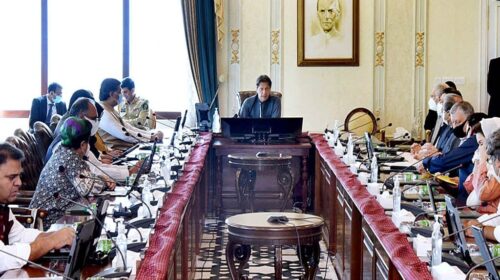The Federal Cabinet has directed Petroleum Division to prepare short, medium and long-term plans to face the looming challenge of depleting gas reserves and re-check to ascertain gas reserves depletion rate so as to determine how much of it was due to theft, collusion and distribution losses, well informed sources told Business Recorder.
These directions were issued at a meeting of the Federal Cabinet on November 30, 2021 when the decisions of Cabinet Committee on Energy (CCoE) taken on November 18, 2021 were presented for ratification.
During discussion, the Minister for Energy, Hammad Azhar, informed the Cabinet that the gas reserves were depleting at the rate of 9 per cent per annum. In absence of any major discoveries in the coming years, the gas reserves would be fully depleted in future due to low rate of replenishment.
He maintained that in such a scenario, there would be increased dependence on imported gas, for which Petroleum Division was vigorously pursuing the setting up of new LNG terminals, as well as, construction of North-South Gas Pipeline with the help of Russia.
Secretary, Petroleum Division, Dr. Arshad; however, said that a new Petroleum Policy was also being formulated to give incentives for exploration of tight gas, which would further pave the way for the extraction of shale gas.
Winter gas shortages likely to continue for a couple of years: Maniar
However, Prime Minister Imran Khan expressed serious concern over the fast-depleting gas reserves and directed that long, medium and short-term plans must be prepared to face the looming challenge. It was suggested that it should be re-checked as to what the actual depletion rate was and how much it was exacerbated due to theft, collusion and distribution losses.
The SNGPL Board has approved in principle, pipeline capacity allocation for Energas for their upcoming LNG terminal that will supply gas on a B2B basis.
According to the Minister for Energy, this paves the way for private sector supply and availability of LNG across the country.
The SNGPL Board has also agreed for the waiver of 66 percent take or pay clause for government-owned LNG plants.
The minister has claimed that in the long run this will help reduce capacity payments that the government has to pay power plants even if they are not supplying electricity.
The government has approved the gas supply mechanism for winter 2021-22, commenced from December 2021 to January 31, 2022, according to which industrial sector’s dedicated consumers of power sector would get uninterrupted gas supply.
The CCoE has also constituted a Committee under the chairmanship of Special Assistant to the Prime Minister on CPEC, Khalid Mansoor, for preparation of oil storage capacity enhancement plan at Keamari, keeping in view existing storage capacities at ports.
On November 18, 2021, the CCoE was briefed about construction of oil storage at oil installations area Keamari.
The Ministry of Maritime Affairs submitted the summary after working on it for several months wherein it proposed that the ban imposed in 1984 on further construction of storage at the KPT’s Oil Installations Areas (OIA), Keamari, Karachi may be lifted. Furthermore, the KPT may be allowed to allocate the land in OIA to registered Oil Marketing Companies (OMCs) and oil refineries operating in Pakistan, after fulfilling all codal regulatory and procedural requirements, for construction of additional oil storage.
In 2016, the Ministry of Defence had refused to lift ban on building of new oil storages at Keamari and asked Petroleum Division to place its viewpoint before the National Security Council.
Pakistan State Oil, sources said, wanted to establish additional storage to maintain adequate fuel reserves aimed at ensuring a smooth supply to the consumers across the country.





